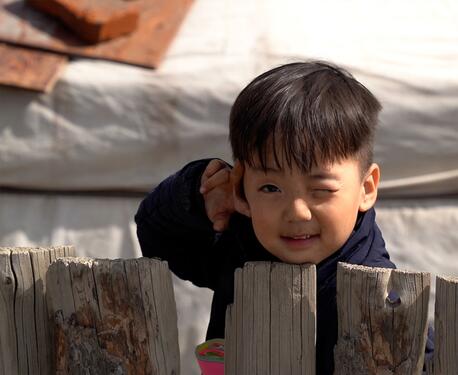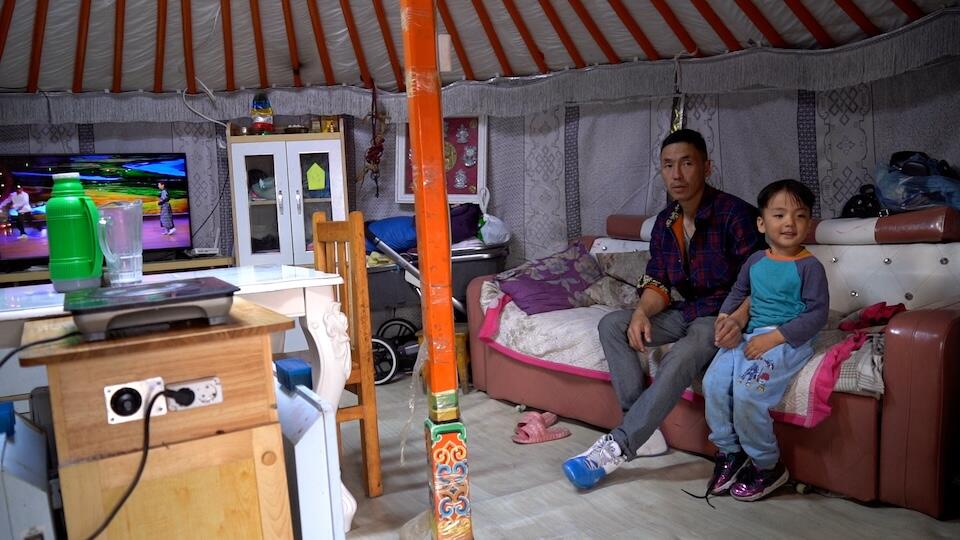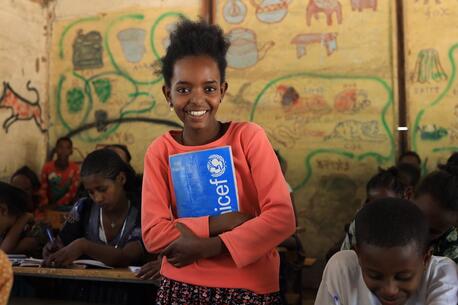
How UNICEF Is Supporting a Green Transition in Mongolia to Improve Children's Health
In Mongolia, air pollution is a public health crisis. Introducing the CHIP, part of a UNICEF-supported initiative to improve indoor air quality — one household at a time.
Tackling air pollution by replacing coal-burning stoves with electric ones
Air pollution is a major health issue for children in Mongolia, contributing to steep rates of respiratory diseases such as flu and pneumonia.
A UNICEF-supported initiative called CHIP — short for cooking, heating and insulation package — seeks to address the problem by facilitating a transition to a clean-energy solution for the traditional Mongolian ger.
A ger is a round tented structure that remains a popular form of family residence in urban areas as well as rural ones. Gers also house many kindergarten classrooms.
The CHIP is a replacement for the coal-burning stove commonly found in gers. Roughly the same size as what it's replacing, the CHIP runs on electricity. Equipped with a user-controlled thermostat, it is also self-regulating.
There are many other advantages for families who make the switch, as G. Jargal, an early adopter who lives in a ger district on the outskirts of Ulaanbaatar, the capital city, explained to UNICEF USA.
Air pollution is a problem in other urban centers across Mongolia, not just in Ulaanbaatar. In a Dec. 29, 2023 op-ed, UNICEF Mongolia Representative Evariste Kouassi-Komlan noted the need for urgent action:
"How many children must fall ill or perish before we collectively recognize the urgency of combating air pollution on a daily basis?" Kouassi-Komlan wrote. "It's time we declare air pollution unacceptable; it's time to acknowledge that the air pollution crisis is a direct assault on the rights of children."
The impact of air pollution on human health and longevity has been increasing as a result of climate change. A June 2024 report released by the Health Effects Institute in partnership with UNICEF found that air pollution is now the No. 2 killer of children under age 5 worldwide.
Air pollution's effects are especially devastating for maternal and child health. Exposure increases risks of stillbirth, low birth weight, pneumonia, bronchitis, reduced lung function and damage to developing children's brains. Read State of Global Air 2024

In Mongolia, the hope is that supporting CHIP adoption will help accelerate the country's transition to clean energy at the household and community level. Blended financing mechanisms are in place to make the switch to the new systems affordable.
So far, about 2,000 CHIP packages have been purchased and installed in individual households and ger kindergartens around Ulaanbaatar and three other province centers.
To help make the case and support the 2019 launch of the program, UNICEF first had to show that air quality was both an indoor and outdoor issue. The package was also tested multiple times to make sure it sufficiently addressed the needs and challenges specific to Mongolian families.
In partnership with Mongolia's Ministry of Health, Ministry of Education and Science and National Committee for Reducing Environmental Protection, UNICEF installed dozens of low-cost air quality sensors in 70 kindergartens. Checking the readings has become a classroom activity and a teachable moment for students.
"Changing behavior is pivotal, and Mongolia's greatest resource lies in its people," Ayako Kaino, Deputy Representative of UNICEF Mongolia, explains. "The innate decisiveness and determination of the Mongolian population can be harnessed through awareness campaigns and persistent communication."
According to UNICEF, at least 144,000 households need to adopt a clean energy solution like the CHIP before the program can be considered a success. "People are investing in this and the political will is there to transform the current condition and create a safe and healthy environment with no air pollution," says UNICEF Mongolia Digital Communications Officer Nominzul Turmurjav. "And UNICEF will be there every step of the way."
Learn more about UNICEF-supported programs in Mongolia.
UNICEF works in over 190 countries and territories to create a more equitable world where every child is healthy, educated, protected and respected. Addressing climate and environmental impacts on children is a cross-cutting issue.
HOW TO HELP
There are many ways to make a difference
War, famine, poverty, natural disasters — threats to the world's children keep coming. But UNICEF won't stop working to keep children healthy and safe.
UNICEF works in over 190 countries and territories — more places than any other children's organization. UNICEF has the world's largest humanitarian warehouse and, when disaster strikes, can get supplies almost anywhere within 72 hours. Constantly innovating, always advocating for a better world for children, UNICEF works to ensure that every child can grow up healthy, educated, protected and respected.
Would you like to help give all children the opportunity to reach their full potential? There are many ways to get involved.



